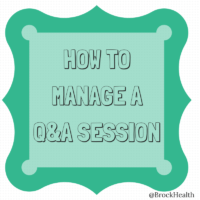In a couple of weeks, Brock Health will be at the CPHR Alberta Virtual Conference. At this trade show and many other trade shows, businesses have the opportunity to give presentations and sit on panel discussions. One of the essential elements to prepare for – and that often gets forgotten – is the question and answer session. Here are some tips we’ve found helpful in our preparation.
If you are quite comfortable with presenting and know the topic very well, you may need very little preparation. You may just choose to think about how much time you want for this or how many questions you will answer.
However, if you feel less confident with the topic, you may choose to do a bit more preparation. You may wish to think about possible questions that may be asked, especially ones that might be difficult to answer or challenge something in your presentation. You can also prepare (to some extent) the answers to these questions. You can even practice the Q&A session with someone who knows or has seen your presentation.
If the Q&A session is part of a presentation and not a panel discussion, make sure it is not the last part of your presentation. Sometimes you can’t do this because the organisers of the event have a fixed format, however, when possible make sure your conclusion comes after the Q&A session.
Q&A sessions are unpredictable, you may get questions you know the answer to and that are friendly, but you can also get questions that you don’t know the answer to or that are hostile to the information given in your presentation. Therefore, ending with an unknown situation is risky. Furthermore, you want to remind the audience of your key message and give a powerful conclusion. Your conclusion after the Q&A doesn’t need to be long.
A Q&A session can be daunting, but by preparing for success you can greatly improve your chances of it going well. Here are some final tips for handling difficult moments:
- What should I do if someone challenges a fact in my presentation?
Remain calm and don’t engage with them if they are particularly hostile. If your presentation has a lot of facts, make sure you have sources and reference for these facts so that you can refer the audience member to the source of the information. Depending on the type of presentation, some information might be open to interpretation. If this is the case, let them know that this is your view and that others may see it differently.
- What should I do if I don’t know the answer to a question?
It is ok to admit that you don’t know the answer to something. You can refer them to someone else who is in the room (if the situation allows). If you are alone you can offer to find out the information for that audience member. Ask them to give you their contact details and tell them you will get in touch with them afterwards. However, make sure that you do this and don’t forget. If the audience member doesn’t receive an answer the will think you were lying to them or that you were lazy and didn’t follow-up.
- What should I do if someone keeps talking and doesn’t ask a question?
Politely interrupt them and ask them for their question. You can explain that in fairness to the other audience members with questions or due to time limits you can only answer one short question per audience member. If they keep talking, be firm and say that you can speak with them afterwards about their point, but that you have to move on to other questions.
- What should I do if I run out of time and there are still more questions?
You can politely close the session by saying something like “I’m sorry, but unfortunately we have run out of time and I can’t take any more questions.” You can also announce that you will take only one more question just before the time is up. If you can stay after the presentation, mention that anyone who still has questions can speak with you after. If not, provide contact details so that anyone with questions can get in touch afterwards. Do not skip your conclusion in favour of a longer Q&A session.
- What should I do if I don’t understand the question?
This can happen to anybody. It is perfectly acceptable to ask them to repeat their question. Alternatively, you can try to summarise what you understood as the question and ask them if this is what they meant. If you begin answering a question, but get interrupted because it is not what the audience member asked, ask them to repeat their question and try to answer. If there is really a fundamental misunderstanding, tell the audience member to speak with you afterwards to discuss their question.


No comments yet.